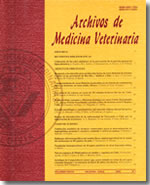Anthelmintic resistance of gastrointestinal nematode in sheep treated with ivermectin and fenbendazole
Main Article Content
Abstract
The aim of the study was to evaluate the presence of anthelmintic resistance in gastrointestinal nematodes of infected sheep treated with ivermectin (IVM) and fenbendazole (FBZ). Thirty six Suffolk Down breed, young-female of eight months of age and 37.2 ± 4.0 kg of body weight (bw) were distributed in three experimental groups of 12 animals each. Group I (Control) was non treated. Group II was treated with IVM at 0.2 mg per kg bw subcutaneously. Group III was treated with 5 mg FBZ/kg bw by oral route. Faecal samples were obtained at 0,7 and 15 days after treatments and processed for faecal egg count test and then faecal egg count reduction test (FECRT) was performed. Group II treated with IVM showed a FECRT of 34 and 77% on days 7 and 15 post-treatment, respectively. The lower limit of 95% interval confidence (LL-IC95%) for this group was 38%. No larval hatching was observed in egg cultures from samples of faeces of sheep treated with IVM. Group III showed an egg count reduction of 74% with a LL-IC 95% of 40%, the genera with the highest frequency of resistance were Teladorsagia and Trichostrongylus. In conclusion, the gastrointestinal nematodes of the studied sheep are resistant to the anthelmintics IVM and FBZ.

